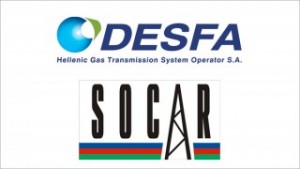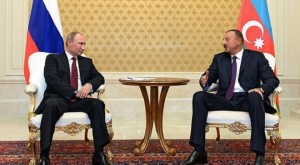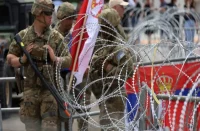Azerbaijan is uniquely poised to assist Russia in its planned ‘Balkan Stream’ gas pipeline through Greece, but it would need to receive tangible economic benefits in exchange for its pivotal cooperation.
Russia’s Vision
Russia is actively moving towards resurrecting the cancelled South Stream project, understanding that the European and Balkan need for gas didn’t disappear in the months since the original pipeline was cancelled in December. At the time, Russia said that it would be partially replacing it with a pipeline to Turkey, and that European countries can then source their gas from a terminal near the Greek-Turkish border. While it’s possible for wealthier Western European countries to buy pricier LNG from that location, the poorer Balkan countries would be entirely cut out of this energy trade.
Additionally, it’s not guaranteed that Europe would buy all of the estimated 63 billion cubic meters of gas a year in LNG that is expected to go through the pipeline when it finally becomes active, meaning that Balkan customers may become a necessity for selling excess supply. Under such considerations, and keeping in mind Russia’s geopolitical, historical, and civilizational interests in the Balkans, it is natural for it to consider an overland route through the region to replace South Stream.
Geography dictates that this would have to go through Greece and Macedonia en route to Serbia, its original hub, before continuing northwards to Hungary and further afield. The problem with the Greek portion of ‘Balkan Stream’ is the same as it was for the Bulgarian section of South Stream, and that’s the EU’s Third Energy Package legislation, which mandates the division between energy suppliers and distributors. Russia’s previous problem was that the EU would not allow it to build South Stream through Bulgaria because Gazprom’s control over both the gas and the pipeline apparently violated this law. How, then, can Russia get around the same problem in Greece that stopped it in Bulgaria?
Azeri Assistance
 This is where Azerbaijan can help. Back in December 2013, SOCAR paid €400 million to acquire a 66% stake in the Greek gas distribution company DESFA, which essentially gave it majority control over that country’s gas network. The thing is, the deal is currently being investigated by the European Commission, which thinks that it could pose a violation of the law in the same manner as Gazprom’s control of the Bulgarian pipeline did for South Stream. The reasoning behind this is that Azerbaijan will be supplying the gas that will go through the planned Trans-Adriatic Pipeline (TAP), which would eventually connect Azerbaijan with Italy. The official decision is to be made on 22 April, but it seems as though it will be favorable for Baku.
This is where Azerbaijan can help. Back in December 2013, SOCAR paid €400 million to acquire a 66% stake in the Greek gas distribution company DESFA, which essentially gave it majority control over that country’s gas network. The thing is, the deal is currently being investigated by the European Commission, which thinks that it could pose a violation of the law in the same manner as Gazprom’s control of the Bulgarian pipeline did for South Stream. The reasoning behind this is that Azerbaijan will be supplying the gas that will go through the planned Trans-Adriatic Pipeline (TAP), which would eventually connect Azerbaijan with Italy. The official decision is to be made on 22 April, but it seems as though it will be favorable for Baku.
The EU has made a big deal out of diversifying its energy resources from Russia, and has been eager for Azerbaijan to play a part, despite the fact that TAP would only bring about 10 billion cubic meters of gas a year to Europe, which is far from being able to compensate for Russia’s enormous sales to the continent. The salient point here to remember though is that the EU’s decision to diversify its pipeline routes is more political than practical, since it’s impossible to immediately replace Russia’s supplies with alternate sources like Azerbaijan’s. Nonetheless, this whole affair is actually advantageous for Azerbaijan, since not only does it elevate its role in Europe, but it also provides an opportunity to assist Russia, the latter of which can lead to concrete benefits for the Caucasian country’s economy. While these will be discussed in the next section, it’s important right now to address exactly how Azerbaijan can help Russia with the ‘Balkan Stream’.
Should the EU Commission rule in Azerbaijan’s favor and allow SOCAR to control the 66% of DESFA that it paid for back in 2013, then the company would be in charge of Greece’s gas distribution. This means that it could potentially construct the Greek portion of the ‘Balkan Stream’, which would allow Russia to comply with the Third Energy Package, since there would be a clear division between Russian gas and Azeri pipeline ownership. Under this scenario, there would be no way for the EU to legally obstruct Russia from going forward with ‘Balkan Stream’, and the South Stream project can thus be resurrected via the improvised Greece-Macedonia route.
Returning The Favor
Such a coordinated arrangement between Azerbaijan and Russia is certainly realistic and feasible, but it needs to bring with it important economic benefits for Baku in exchange. As is known, the New Manat underwent an official depreciation of about one-third last month, showing that now is the perfect time for Azerbaijan to make the transition from a natural resource-based economy to a more diversified one. This is a pragmatic step that must be taken sooner or later, and it’s in the country’s best interests to acquire Russian help in doing so while the opportunity and interest are still on decision makers’ minds.
The most concrete way in which Russia can help boost Azerbaijan’s ‘real’ (non-natural resource) economy is by facilitating a free trade agreement between it and the Eurasian Union. Azerbaijan is already perfectly positioned to serve as the key to linking Russian-Indian trade via Iran, and if it can do both this and distribute Russian gas in Greece through its SOCAR-owned DESFA pipeline, then Baku would be in an invaluable position to Moscow.
 Under these circumstances, it’s natural for Azerbaijan to ask for preferential trade terms with the Eurasian Union, at the very least. This would expand the marketplace in which it can sell its tangible goods (such as cars and other factory-created products), thereby enhancing the chances that Azerbaijan will succeed in its goal of transitioning into a more traditional economy. Doing so would guarantee the stability of the New Manat and offset any future turbulence from uncertain energy prices in the coming years.
Under these circumstances, it’s natural for Azerbaijan to ask for preferential trade terms with the Eurasian Union, at the very least. This would expand the marketplace in which it can sell its tangible goods (such as cars and other factory-created products), thereby enhancing the chances that Azerbaijan will succeed in its goal of transitioning into a more traditional economy. Doing so would guarantee the stability of the New Manat and offset any future turbulence from uncertain energy prices in the coming years.
Concluding Thoughts
Azerbaijan and Russia’s actions in Greece constitute a major strategic gambit for both sides, in that Baku and Moscow are each expected to receive enormous benefits if their collaboration succeeds. As it stands, everything is currently up for grabs and is dependent on the European Commission’s ruling on 22 April about SOCAR’s acquisition of DESFA. If it turns out to be in Azerbaijan’s favor (and the political-energy situation between Brussels and Baku indicates that it will be), then Baku and Moscow can initiate proposed policy coordination outlined in this article. Successful collaboration would allow Russia to build the geostrategic ‘Balkan Stream’ pipeline and replace South Stream, while it would give Azerbaijan the much-needed opportunity to transition its economy away from a natural resource foundation and more towards a conventional one.
The article was originally published by the Moscow-Baku portal in Russian, the English text is exclusive for ORIENTAL REVIEW.














Pingback: The Azeri-Russian Gas Gambit In Greece… | Protestation